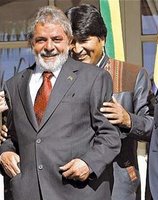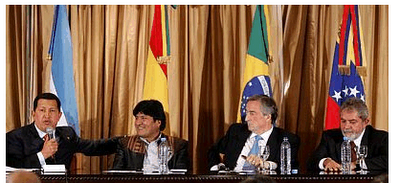 Bolivian president Evo Morales has put president Lula in a difficult position. In a move to fulfill his campaign promise of nationalizing oil and gas in Bolivia, Morales published a decree that directly affected Petrobras, the Brazilian state-owned oil company. Even though it was an expected decision, it was implemented in a sensational way by placing Bolivian troops in charge of the company's plants and by the prominent role played by Venezuela's president Hugo Chavez in the process. This has put Lula under another fierce crossfire as he faces an already turbulent electoral year. His administration’s foreign policies are now also under attack.
Bolivian president Evo Morales has put president Lula in a difficult position. In a move to fulfill his campaign promise of nationalizing oil and gas in Bolivia, Morales published a decree that directly affected Petrobras, the Brazilian state-owned oil company. Even though it was an expected decision, it was implemented in a sensational way by placing Bolivian troops in charge of the company's plants and by the prominent role played by Venezuela's president Hugo Chavez in the process. This has put Lula under another fierce crossfire as he faces an already turbulent electoral year. His administration’s foreign policies are now also under attack.
“Last week we helplessly watched the Bolivian army, under the command of president Evo Morales, invading Petrobras’ plants in Bolivia. Everything was done by armed soldiers. I believe this situation represents a great defeat for Brazilians, especially for president Lula and the minister of foreign affairs, Celso Amorim.”
Brasil X Bolívia = Lula 0, Evo Morales 10, Hugo Chávez 100 – Daniel Yang Blog“We were still under the influence of the announcement of Brazilian oil self-sufficiency when president Evo Morales declared his intention of expropriating EBX iron company. On May 1st he went ahead and edited the Supreme Decree nationalizing all gas and oil operations in Bolivia, a hard hit on Petrobras. Not happy with that, he ordered an ostentatious and unnecessary occupation of 53 gas and oil installations controlled by foreign companies. Under the decree (n. 28.701), Petrobras and other companies have been reduced to mere operators of oil and gas production in Bolivia, receiving only 18% for their services from Yacimientos Petrolíferos Federales de Bolívia (YPFB).
The oil is theirs – Total Alert – Blog
As regularly happens in recent times, the mainstream media are thrilled by the opportunities for sensationalism. They consistently manage to set facts in hot frames and throw more fuel on the political fire. Those moves are critically considered by the blogosphere in minutes.
“I was walking down the street today and looked at the magazines on the news stand. One of them, ‘IstoÉ’, had on its cover: ‘Evo Morales, the man who can paralyze Brazil’. The illustration showed a picture of the cocalero leader attached to a gas stopper with a lighted wick — that traditional cartoon scene that precedes big explosions. How sad. Firstly, because of the falsehood involved. Bolivian gas covers only a little part of the Brazilian energetic matrix, which, as we all now, is mainly supported by hydroelectricity. In terms of fuel, gasoline is champ and we are now self-sufficient in oil. There is also high usage of alcohol coming from our own ecologically troubled monoculture crops.”
angry media – reverse – blog
The online debate goes on, presenting arguments of varied hues, bringing new information coming from totally diverse perspectives, forming a rich mosaic on how to approach the issue.
“I believe that this decision from president Evo Morales is a sovereign act from a democratically elected legitimate government. It is in many ways similar to when Brazil created Petrobras and the oil state monopoly in the 50’s. But I think Brazil has to be firm in defending our interests and not permitting expropriating processes. It's necessary to establish a rational process and avoid emotional decisions. A negotiation is needed that is capable of attending to the legitimate demands of all the parties involved and of assuring the continuing partnership between Brazil and Bolivia in the oil and gas arena.”
Morales’ marketing strike! – Management Shock – Blog“The foreign relations ministry sees Bolivia as a country near insolvency. It would break if Brazil was to stop gas imports. But this would not be a good decision for Brazil as some of industries of the south and southeast depend on the Bolivian gas and because there is fear that a worse crisis would push Evo Morales to even more radical moves. This could just throw him into the arms of Chávez.”
Petrobrás plays hard with Bolivia while Lula tries to contain Chávez – Global Life
The temperature was already hot, and became hotter after the meeting of the four presidents — Chávez, Morales, Kirchner and Lula — which happened two days after the Bolivian announcement. Chávez stopped in Bolivia to give Morales a plane ride to Foz do Iguazu — the world famous waterfall region in the triple border between Brazil, Argentina and Paraguay. Lula was certainly not pleased with the tone of the conversation, showing visible impatience with the talkative Venezuelan. However, in the midst of difficulties and criticisms, the Brazilian president persisted in asserting that Latin American economic integration is a top priority of his foreign policy.

“The meeting between the presidents of Argentina, Brazil, Bolivia and Venezuela in Porto Iguaçu, Paraná, seemed to be the right moment for the Brazilian government to resolve the situation. Lula spoke and deflated the crisis by making the case for Bolivia. He also said that the gasodute project would unite the four countries and result in a good option to prevent any scarcity in the energy sector. Deals with Argentinians, Bolivians and Venezuelans? God help me! Argentineans complain about everything that comes from Brazil, Bolivia you already knows about, and Venezuela… Well, the problem in Venezuela is Hugo Chávez.”
Crise: Brasil x Bolívia – Blog do Noel“There were three hours of meetings. But many more will necessary to digest the blow: the president (of Brazil?) was not only conniving with the savagery but congratulated with it. The truth is that Lula does not have any pride. He was stabbed in the back in a conspiracy he thought he had under control and he responded by asserting a romantic ideal of ultra-worldly union. Like a cheated husband who accepts the orgies of his wife, he now begs for a place in the sun.”
Who could defend us? – The conservative pulpit – BlogIn other times, everything which is happening now would be considered ‘a crime against the nation’, ‘a commonwealth malfeasance’, and the government would be called ‘weak’. Nothing like this happened. The reaction was silence. We hope that Evo Morales does not decide to invade Brazil, alleging that he was cheated on the Petrópolis Treaty, signed in 1903, in which Bolívia sold Brazil the territory of the state of Acre .
Watch out Evo – Ideas in the wind – Blog
The debate about the issue will keep being influenced by the electoral climate. The Brazilian international presence has been recognized for its effectiveness in reshaping the debate over global trade issues and by its influence in realigning political forces at the global level. Lula knows that it is important to maintain the chosen strategy of his foreign policy. Even under electoral fire, he can still find many voices ready to back his position and praise the importance of regional integration.
“Bolivia is the poorest country in South America. Its economy was commanded by successive neo-liberal governments who handed Bolivia’s natural resources to foreigners, while promising to help the country in bringing external money to leverage living conditions in Bolivia, which never happened. Bolivia turned out to be a ‘casa da mãe Joana’ and Petrobrás, during the government of Fernando Henrique Cardoso, was able to piss with the door open and place its boots on the table. What Morales did was to create order in his home. He is not sending Petrobrás away. He is just telling Petrobrás to close the door while pissing and to take its boots off the table.”
Crisis??? – Reelection Blog“What answer should be given? Would it be to invade Bolivia, a country where people live with 20% of the Brazilian average income? To do a military attack on an economy a hundred times smaller? In a world dominated by the morals of profit, such a Brazilian reaction could only be seen as weird. ‘Voices from the media will say the contrary, but the position taken by President Lula was totally right. He recognized Bolivia's sovereignty and the need for international aid to that poor country’, said Hélio Jaguaribe (sociologist and founder of the PSDB opposition party)”
Critics try to stop the move towards south american union – André Barrocal – Carta Maior
The issues of regional integration will be on-going as all of South American searches for its right balance of union and nationhood in the new paradigms of globalization. We will be monitoring the blogosphere closely on these issues and new information will be posted in the comments section. Stay tuned.







3 comments
Thanks Jose for this article.
Brazilian Blog Reaction
The newest Global Voices Online contributor, José Murilo Junior will be responsible for the round-ups of the Brazilian blogs. His latest article deals with Brazilian blogger reaction of Evo Morales’ announcement of nationalization of the hydrocarbon…
facinating summary of the blogs. obrigado, gracias, thanks